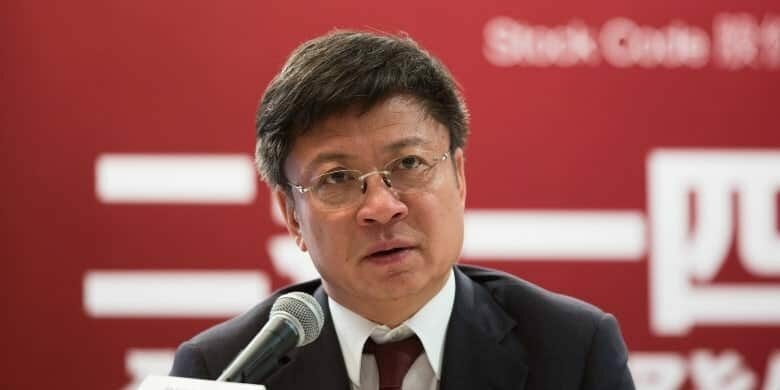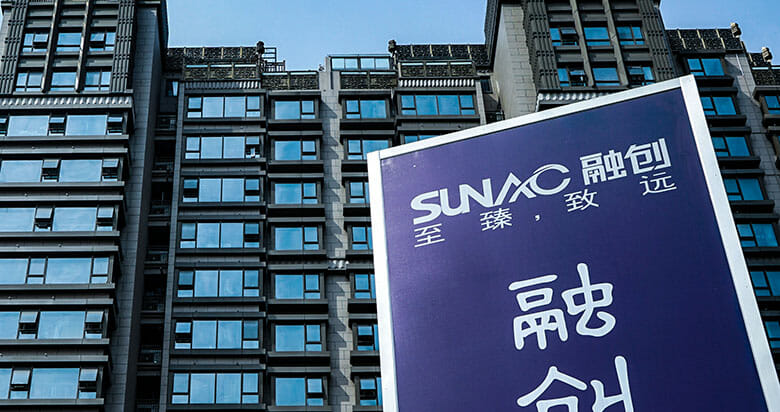
Sunac Chairman Sun Hongbin
Sunac China failed to pay $29.5 million in interest on $750 million in senior notes within a grace period that ended Wednesday, sending the mainland’s third-largest developer by contracted sales into default.
In a statement to the Singapore stock exchange, the company apologised for its failure to make the interest payment, which was originally due on 11 April, and added: “The Group asks that creditors allow the Group time to overcome challenges in the current phase.”
The default puts Sunac at risk of having creditors demand immediate repayment of the outstanding $741.6 million in principal due on the October 2023 bonds that were issued in April 2019. In its statement, Sunac said it had yet to receive a request from bondholders to accelerate payment of the outstanding principal amount.
Beyond the missed interest payment, Sunac still needs to settle a combined $75.2 million in interest this month for three other bond series, which have a $2.2 billion principal amount when combined with the October 2023 bonds. The developer warned that it will likely also miss the deadlines for these financial obligations due to factors including its declining contracted sales and difficult economic conditions in China.
Revenue Drops, Credit Evaporates
The default places Tianjin-based Sunac among a growing cadre of mainland developers who are facing debt restructuring after China’s “three red lines” credit policies brought an abrupt end to decades of debt-fuelled growth.
While Chinese regulators have begun easing credit restrictions and loosening housing market policies, homebuyers remain sceptical, particularly of projects led by troubled builders like Sunac, and offshore lenders have also grown wary.
After rating agencies Moody’s and Fitch downgraded the developer in March, citing its heightened liquidity and refinancing risks, Sunac said its already limited access to new capital has been further blocked by the downgrade of its investment rating.

A Sunac residential complex in Shanghai
Moody’s lowered the company’s corporate family rating to Caa1 from B1 and its senior unsecured ratings to Caa2 from B2. Meanwhile, Fitch slashed the company’s issuer default rating, senior unsecured rating and outstanding senior unsecured notes to CC from B before eventually withdrawing the ratings in April after Sunac opted to cease participation in the process.
Making things worse for Sunac is the rapid decline in its contracted sales, which has been further exacerbated by the COVID-19 pandemic. In March and April, the contracted sales of the group dropped 65 percent year-on-year.
On 21 March, Sunac said it expected an 85 percent year-on-year decline in its profit attributable to owners for full-year 2021. Similarly, it warned of a roughly 50 percent drop in core net profit for the comparable period.
Days after, on 28 March, the company announced that it would not be able to publish its 2021 results by the 31 March deadline, due to uncertainties in its financial statements. The Hong Kong exchange responded by suspending trading in the group’s shares on 1 April.
Seeking Help
In a bid to meet its financial obligations, Sunac has accelerated asset sales and obtained interest-free loans from its controlling shareholder and chairman, Sun Hongbin, through his private investment vehicle Sunac International Investment Holdings.
Among the assets liquidated, Sunac last year sold 45.4 million shares in mainland property brokerage Beike to raise $1.08 billion. In January, the developer cancelled its $360 million acquisition of Modern Land’s property management unit as it sought to maintain liquidity. This month, the company was reported to be in discussions to divest its interest in the world’s largest indoor ice and snow playground, which is being developed in Shenzhen.
To resolve its credit crisis, Sunac has hired Houlihan Lokey to be its financial adviser and Sidley Austin to assess its capital structure and “formulate an optimal solution for all stakeholders”.
The same restructuring specialists are already assisting Kaisa Group Holdings, which defaulted on a series of bonds in December, with Houlihan Lokey having also been engaged by China Evergrande, which has become the standard bearer for China’s developer debt crisis.
Sunac warned that should it be unable to reach an agreement with creditors it could result in the acceleration of its financial obligations, which could involve lenders demanding immediate payment of $450 million in 8.35 percent senior notes maturing in April 2023, $400 million in senior notes payable in October 2024, and $600 million in senior notes due in April 2024.
Leave a Reply